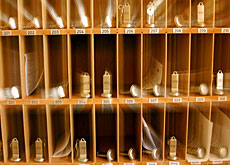Hotels cool to climate change

There are nearly 6,000 hotels and health spas in Switzerland yet only 20 of them – or less than half of one per cent – are recognised as environmentally friendly.
The average Swiss hotel produces 93 tons of carbon dioxide emissions a year, well above recommended norms. The accommodation sector is now making efforts to improve its record.
A joint study completed by the hotel and hospitality schools in Lausanne and Lucerne in 2004 concluded that there was “significant energy-saving potential in the Swiss hotel economy”.
The detailed report found that the average hotel consumed 20 per cent more heating oil and 45 per cent more electricity than stipulated by Swiss norms, and that six per cent of a tourist accommodation’s annual turnover goes towards energy costs.
More worryingly, the study, “Energy efficiency and CO2 emissions in the Swiss hotel economy”, found that few hotel owners surveyed expressed an interest in addressing the issue. Many felt they could not afford to make the required investments.
While improving a building’s insulation or installing heating systems to take advantage of renewable energy sources can be costly, the report pointed out that a ten per cent reduction of CO2 emissions could be achieved through simple measures, which would also save money.
Hotels are advised to turn off devices and appliances when not in use and to avoid using stand-by modes, and install water-saving fittings on taps and showers.
The umbrella organisation, the Swiss Tourism Federation, has joined the chorus calling on hotels to realise their energy-saving potential. Along with the Federal Environment Office, the federation has introduced the European Union “Eco-label” for tourist accommodation.
Waste reduction
Certified hotels must meet wide-ranging criteria to lessen tourism’s impact on the environment, including waste reduction, the promotion of public transport and use of organic and seasonal products from local suppliers.
Five establishments applied for and received the label in 2006 and a further 15 have the equivalent Swiss “ibex” seal of approval which holders can, at little additional effort, convert into the EU version.
“We chose to use this label because it is not as stringent as some requiring the installation of solar panels, for example,” Mila Trombitas of the federation told swissinfo. “Neither is it a label with little or no value given to anyone who applies.”
The country’s main hotel association, Hotelleriesuisse, supports the project but admits that encouraging its 2,000 odd members to go green will not be easy.
“The criteria are tough,” says the association’s Isabel Garcia. “A lot of work needs to be done, but our members are beginning to realise that it’s important to have a clear position in the market by specialising, and this is one way to do that.”
Disposable
Trombitas says a firm commitment to reducing waste is a sticking point, particularly in the luxury four- and five-star hotel category. She said these establishments want to continue using disposable toiletry products in the rooms instead of refillable dispensers.
Beat Anthamatten, managing director of Ferienart in Saas Fee, Switzerland’s first and only five-star hotel to be awarded the EU eco label, has found a way of meeting guests’ needs without compromising on ecology.
His hotel staff only place disposable soaps and shampoos in rooms when his customers express such a wish.
“We are a part of the economy that relies the most on an intact environment, therefore we have to be respectful,” Anthamatten told swissinfo.
He calculates that only about five per cent of his guests choose the Ferienart due to its environmental policy, but adds the hotel has not yet used its ecological record to market itself, though it soon will.
“With the attention given to climate change, consumers will increasingly opt for an eco-hotel if standards are not compromised,” he says.
Anthamatten agrees that financial constraints hinder more hotels from investing in green technology.
But the study by the hotel and hospitality schools points out that the tourist accommodation branch can no longer afford to have the dubious distinction of being the worst polluter in the Swiss services sector when it comes to the burning of fossil fuels.
swissinfo, Dale Bechtel
Tourist accommodation must fulfill mandatory criteria and some optional criteria before being awarded the EU eco-label.
The wide-ranging criteria is divided into a series of sections:
Energy, water, staff training and guest information, green procurement, waste, hazardous chemicals and miscellaneous items such as promotion of local products.
In 2005, there were 5,836 hotels and health spas in Switzerland, which, as a whole, emit between 390,000 and 530,000 tons of CO2 emissions a year.
The hotel industry is responsible for 1.4% of the country’s total energy use.
The average Swiss hotel spends SFr100,000 ($83,000) annually to meet its energy needs, including operation and maintenance.
The hospitality industry (hotels, spas, restaurants, cafes) use fossil fuels to meet half of their energy requirements, well above the 40% average for Switzerland’s services sector.

In compliance with the JTI standards
More: SWI swissinfo.ch certified by the Journalism Trust Initiative

You can find an overview of ongoing debates with our journalists here. Please join us!
If you want to start a conversation about a topic raised in this article or want to report factual errors, email us at english@swissinfo.ch.